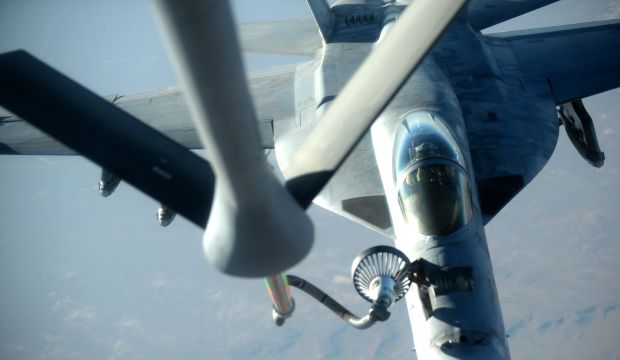
A U.S. Navy F-18E Super Hornet fighter jet receives fuel from a KC-135 Stratotanker over northern Iraq after conducting airstrikes in Syria on ISIS on September 23, 2014 (AP Photo/U.S. Air Force, Shawn Nickel, File)
The Britain-based Syrian Observatory for Human Rights said the attacks occurred shortly after midnight, adding that they also hit a plastic factory.
ISIS fighters have control over oil produced in eastern Syria and have set up small, makeshift refineries to distill the crude into fuel, one of their main sources of income.
“These so-called refineries are not a real target and they do not weaken [ISIS] as they do not have any financial value for them,” Rami Abdulrahman of the Observatory told Reuters.
“They are composed of trucks with equipment to separate diesel and petrol used by civilians.”
The United States has been carrying out strikes in Iraq since August 8 and in Syria, with the help of Arab allies, since Tuesday, in a campaign it says is aimed at “degrading and destroying” the Islamist militants who have captured swathes of both countries.
Abdulrahman said that destroying the makeshift refineries has led to a sharp increase in the price of diesel, adding that for residents in Syria’s northern Aleppo province, for example, the price has more than doubled.
“The price went up from 9,000 Syrian pounds to 21,000 in Aleppo. Hitting these refineries has affected ordinary people, now they have to pay higher prices.”
A medium-sized makeshift refinery, stationed on trucks, can refine up to 200 barrels of crude a day into fuel and other products. The refineries, which Syrian opposition sources say cost up to 230,000 US dollars to set up, are assembled in Turkey and transported into Syria.
But the impact of the strikes on the militant group’s capabilities was not immediately clear. ISIS has gained support among Islamists following the attacks, including from rival groups.
Scores of fighters have left Al-Qaeda’s Al-Nusra Front and other Islamist groups in Syria to join ISIS since the strikes started.
The Al-Nusra Front is coming under increasing pressure from its own members to reconcile with ISIS to fight what they describe as a “crusader” campaign against Islam.
On Saturday, the group gave its first reaction to the strikes, vowing to retaliate against Western and Arab countries that took part in the coalition.
“It’s not a war against Al-Nusra Front, it’s a war against Islam,” Nusra spokesman Abu Firas Al-Suri said in an audio message published on the group’s social media network.
“These countries have done a despicable act that will put them on the list of those targeted by jihadist forces all over the world,” the spokesman said.
The airstrikes have failed so far to stop the advance of IS fighters on Syria’s Kurdish town of Kobani near the border with Turkey which the group has besieged from three sides, triggering an exodus of more than 150,000 refugees and sending mortar shells into Turkish territory.
On Saturday, the US-led coalition bombed ISIS positions around the town, a move that was welcomed by Asya Abdullah, a senior official in Syria’s dominant Kurdish political party the Democratic Union Party (PYD). She also said that Kurds were ready to work with the alliance to fight ISIS and urged Turkey to provide them with weapons.
“We are ready to establish a dialogue with anyone fighting [ISIS], including opposition forces in Syria, such as the Free Syrian Army,” she told Reuters via phone, speaking from Kobani, whose strategic location linking north and northwestern Syria has blocked Sunni insurgents from consolidating their gains in Syria.
“Turkey should arm the PYD . . .These IS gangs will one day cause great harm to Turkey. Kobani is right at the border, if these gangs enter Kobani nothing will stop them from going to Turkey next,” she said.
Her call is unlikely to be met with a positive response given Ankara’s discontent over Kurds’ growing clout in Syria, having fought for three decades on its own soil against the outlawed Kurdistan Workers’ Party (PKK).
PYD, which has close links to the PKK, has emerged as the most powerful Kurdish political group in Syria since civil war broke out there more than three years ago, and in January declared self-rule in northeast Syria, bordering Turkey and Iraq.
About 300-400 Syrian Kurds crossed back into Syria on Sunday from Turkey to help fight against ISIS, a soldier on the border told Reuters, adding that Turkish authorities were not allowing any Turkish Kurds to go to Kobani.
Several hundred Kurds were waiting at Mursitpinar, on the Turkish side of the border, in the hope of being allowed to fight alongside their people in Syria, a Reuters witness said.
“[ISIS] is evil, of course we want to go and fight,” Mustafa Durdu, a Turkish Kurd who has not been permitted to leave Turkey by Turkish authorities. “Our brothers are there,” he said, pointing to Kobani.
